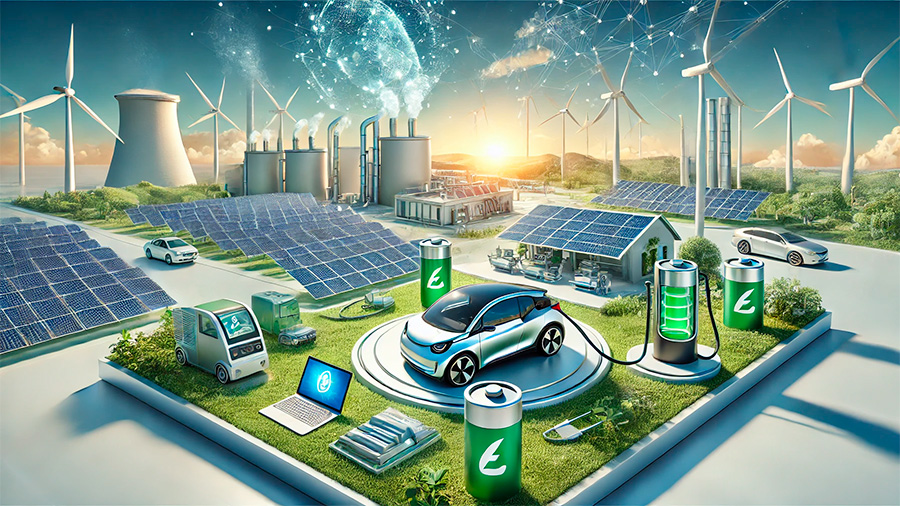
Titanium, lithium, and aluminum are not only essential raw materials but also foundational to some of the most cutting-edge technologies of today. From aerospace innovations to renewable energy solutions and advancements in consumer electronics, these metals are driving progress across multiple sectors. Their unique properties—such as strength, lightness, and conductivity—make them indispensable in modern manufacturing. This article explores how titanium, lithium, and aluminum contribute to technological advancements and enable new innovations across industries.
The Role of Titanium in Aerospace and Defense
Titanium is one of the most important metals in the aerospace and defense sectors. Known for its remarkable strength-to-weight ratio and resistance to corrosion, titanium is used extensively in the manufacturing of high-performance aircraft, spacecraft, and military equipment. These properties make titanium a critical material for ensuring the safety, efficiency, and durability of cutting-edge aerospace technologies.
1. Titanium in Aircraft Manufacturing
In the aerospace industry, titanium is used in the production of both military and commercial aircraft. Its light weight and high strength make it ideal for reducing the overall weight of airplanes while maintaining structural integrity. Titanium is commonly used in turbine engines, landing gears, and critical structural components.
The contribution of titanium to aerospace technology:
- Lightweight strength: Titanium’s strength-to-weight ratio allows for the creation of lighter, more fuel-efficient aircraft, which can significantly reduce operating costs in the aviation industry.
- Corrosion resistance: Titanium’s resistance to corrosion, particularly in harsh environments such as high altitudes and extreme temperatures, ensures the longevity and reliability of aircraft components.
- Increased performance: The use of titanium in aerospace engineering leads to improved speed, fuel efficiency, and overall performance, contributing to the advancement of modern aviation technology.
2. Titanium in Space Exploration
Titanium is also a crucial material for space exploration. It is used in spacecraft components, rocket engines, and satellite construction due to its ability to withstand the extreme conditions of space. Titanium’s resistance to heat, combined with its lightweight nature, makes it ideal for the demands of space missions.
How titanium supports space exploration:
- Heat resistance: Titanium can withstand the intense heat generated during space launches, helping protect vital spacecraft components from damage.
- Durability and strength: The metal’s durability ensures that spacecraft and satellite components can endure long missions without degrading or failing.
- Advanced materials for new missions: As space exploration continues to evolve, the demand for titanium increases, particularly in next-generation spacecraft designed for missions to Mars and beyond.

The Critical Role of Lithium in Renewable Energy and Consumer Electronics
Lithium is one of the most important metals for the development of renewable energy solutions and consumer electronics. Its use in rechargeable batteries powers everything from electric vehicles (EVs) to portable devices, making it indispensable in the push toward more sustainable and energy-efficient technologies.
1. Lithium in Electric Vehicles (EVs)
The electric vehicle revolution has been one of the primary drivers of lithium demand. Lithium-ion batteries are the power source for most EVs, providing the energy density needed for long-range travel while being lightweight enough to enhance vehicle efficiency.
The role of lithium in the EV market:
- Energy storage: Lithium-ion batteries are ideal for storing large amounts of energy in a compact form, allowing EVs to travel longer distances without significantly increasing vehicle weight.
- Charging speed: Lithium-based batteries are known for their fast-charging capabilities, reducing the downtime required for recharging and making electric vehicles more convenient for consumers.
- Driving the green revolution: As governments push for cleaner transportation solutions to reduce carbon emissions, lithium plays a pivotal role in making electric vehicles a practical alternative to traditional gasoline-powered cars.
2. Lithium in Renewable Energy Storage
Lithium batteries are also central to the growth of renewable energy, particularly in energy storage systems for solar and wind power. These systems allow excess energy generated during periods of high production to be stored and used later, stabilizing the power grid and increasing the reliability of renewable energy sources.
Impact of lithium in renewable energy storage:
- Grid stabilization: Lithium-ion batteries help stabilize the power grid by storing surplus energy generated from renewable sources, ensuring that energy is available during low-production periods.
- Energy independence: With efficient energy storage systems, communities and businesses can reduce their dependence on traditional, non-renewable energy sources.
- Reducing carbon footprint: The use of lithium-based energy storage systems enables a greater shift toward green energy, making renewable power more viable and contributing to efforts to combat climate change.
3. Lithium in Consumer Electronics
In addition to its role in the automotive and energy sectors, lithium is crucial to the production of batteries used in consumer electronics, such as smartphones, laptops, and tablets. Lithium-ion batteries provide the power needed to run these devices efficiently and reliably, driving consumer demand for high-performance, portable electronics.
The role of lithium in modern consumer devices:
- Long-lasting batteries: Lithium batteries are lightweight, durable, and capable of holding a charge for longer periods, allowing consumers to use their devices for extended hours without needing frequent recharges.
- Advancing technology: Lithium batteries enable the development of increasingly powerful and feature-rich electronics, fueling innovations in computing, telecommunications, and personal technology.
- Portable power: Lithium’s efficiency and compact size allow electronics manufacturers to create lightweight, high-powered devices that are highly portable, driving the ongoing demand for mobile technology.

The Role of Aluminum in Manufacturing and Technology
Aluminum is one of the most versatile and widely used metals in the world, essential for industries ranging from aerospace to automotive manufacturing. Its lightweight, corrosion-resistant properties make it an indispensable material in the production of high-tech components used in various advanced technologies.
1. Aluminum in the Aerospace Industry
In aerospace engineering, aluminum is widely used in aircraft and spacecraft construction due to its low density and high strength. It plays a crucial role in reducing the weight of aircraft, which directly impacts fuel efficiency and overall performance.
Aluminum’s contribution to aerospace technology:
- Lightweight materials: Aluminum helps reduce the weight of aircraft, contributing to greater fuel efficiency, lower emissions, and improved performance.
- Durability and strength: The metal’s strength and ability to withstand extreme conditions make it ideal for use in critical aerospace components, such as wings, fuselages, and engine parts.
- Corrosion resistance: Aluminum’s resistance to corrosion ensures that aerospace components can withstand the harsh environments they encounter during flight and in space.
2. Aluminum in Energy Efficiency and Renewable Energy Technologies
Aluminum is also essential in the development of energy-efficient technologies. Its use in construction materials, solar panel frames, and other renewable energy systems helps reduce weight while improving performance.
The role of aluminum in sustainable energy:
- Solar energy: Aluminum is used in the frames of solar panels, helping to keep them lightweight and durable while contributing to overall system efficiency.
- Energy-efficient construction: Aluminum’s role in building materials, such as windows, doors, and facades, improves the energy efficiency of homes and buildings by reducing the need for energy-intensive materials.
- Electrification: Aluminum’s use in electric vehicles (EVs) and public transport helps reduce the weight of these vehicles, enhancing their energy efficiency and contributing to the green economy.
3. Aluminum in Consumer Electronics
Aluminum is a critical material in the production of consumer electronics, from smartphones to laptops. Its lightweight, aesthetic appeal, and ability to dissipate heat make it ideal for use in electronics casings, cooling systems, and other key components.
How aluminum is used in consumer electronics:
- Durable casings: Aluminum is commonly used for the exteriors of smartphones, laptops, and tablets due to its ability to withstand scratches, dents, and environmental stressors.
- Cooling solutions: Aluminum is widely used in heat sinks and cooling systems for electronics, helping to maintain optimal operating temperatures and prevent overheating.
- Lightweight design: Aluminum’s low weight contributes to the portability of modern electronic devices, which is a crucial factor in consumer satisfaction.
Conclusion
Titanium, lithium, and aluminum are indispensable in the development and growth of several high-tech industries, from aerospace to renewable energy and consumer electronics. Their unique properties enable cutting-edge technologies that drive global economies, improve energy efficiency, and contribute to sustainability. As demand for these metals continues to grow, securing access to them will become increasingly important for nations and industries looking to remain competitive in the ever-evolving technological landscape. By continuing to innovate in extraction methods, recycling technologies, and material science, these metals will continue to power the next generation of technological advancements.





